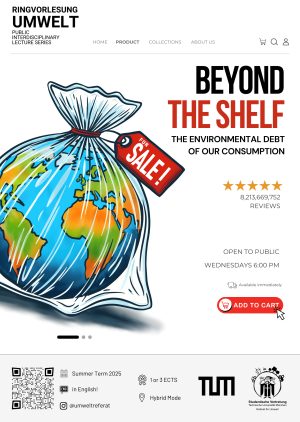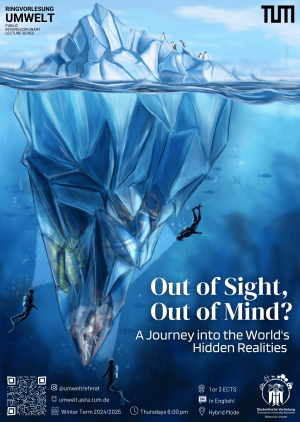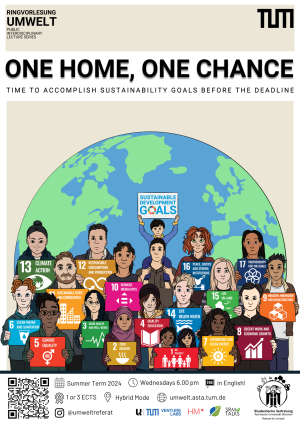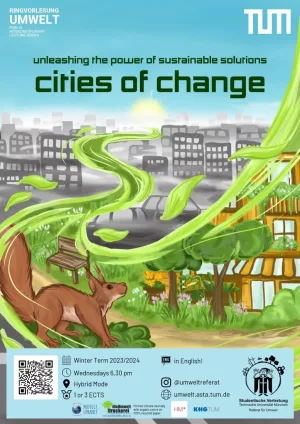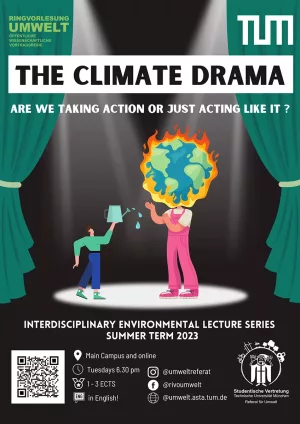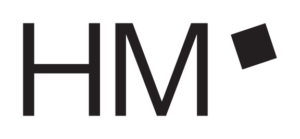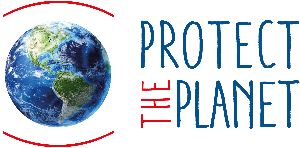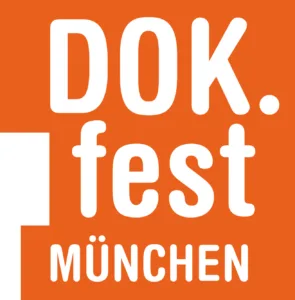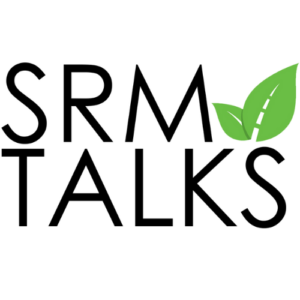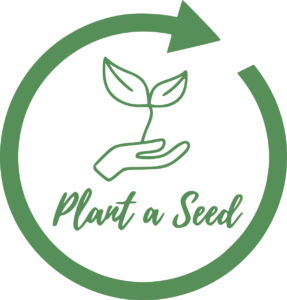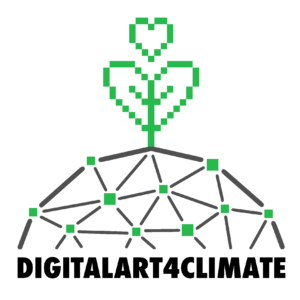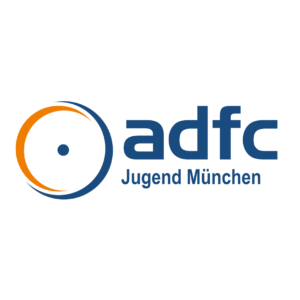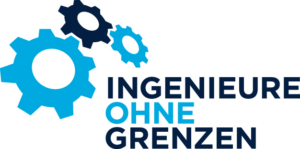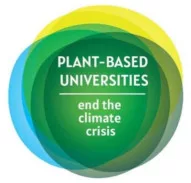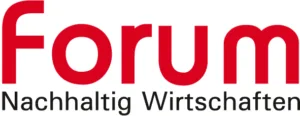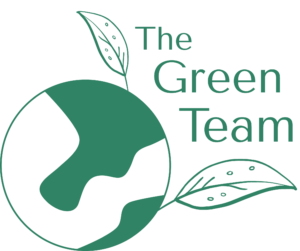Est.1985
Environmental Lecture Series
Winter Semester 2025/2026
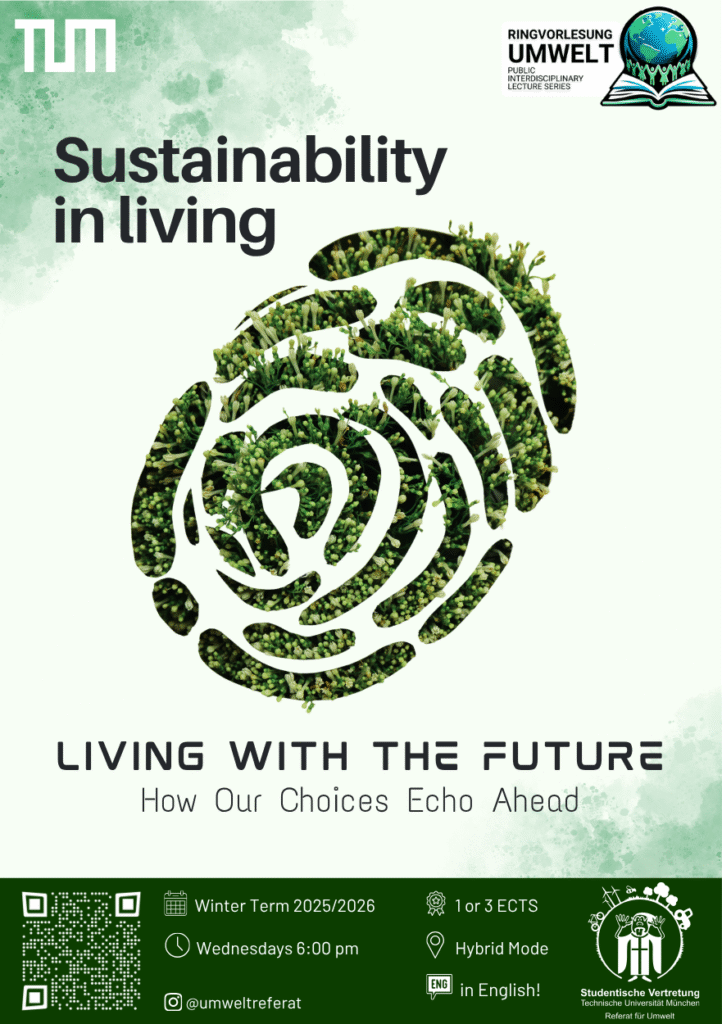
living with the future: how our choices echo ahead
How do you dream about the future? Can you depict a common future in which sustainable living is accessible, fair, and desirable for all? Will our cities, homes, and communities be resilient or vulnerable? Will the habits of today echo as problems or solutions for the generations to come?
Sustainability is imprinted on every aspect of our lives, from how we build our homes and move through cities to how we eat, work, and travel. A sustainable lifestyle is not just about individual habits, but also about rethinking our current systems. Every action and plan shape tomorrow’s world. So how should we live today knowing that our choices will affect the future?
The lecture series “Living with the Future: How Our Choices Echo Ahead” invites you to explore these questions through enriching perspectives and experiences, both as learners and contributors actively shaping the dialogue. Each week, speakers from science, business, politics, and civil society will share stories, insights, and challenges that bring sustainable living into focus. Throughout the series, interactive activities will give you the chance to share the stage, exchange ideas, and co-create solutions. Together, we will find inspiration and discover concrete pathways to shape lifestyles that echo positively into the future.
For everybody else
lectures and events
Subscribe to Calendar
In our introductory session, you will:
- meet our team
- get an overview of our course and lecture structure
- try out our Engagement Lab
- and have the space to ask any questions you may have

In his lecture “AI: World Maps, Intelligence and Parrots” Michael explains how today’s AI systems inhabit the space between genuine intelligence and sophisticated statistical parrots. Since many of the half-truths surrounding AI contain a kernel of truth, it’s essential to grasp the real challenges that accompany its growing use. His talk ranges from model architecture to energy demands, and from safety to cost. Nevertheless, the lecture is highly accessible to non-technical audiences, and gives a sharp and balanced view of what AI is—and what it isn’t.
Michael Schmidt first studied Business Administration but soon found himself captivated by the world of IT. His journey led him along the path from Excel Nerd → Data Analyst → Data Engineer → Data Scientist → AI Developer. He has given several lectures on Data Visualization and Artificial Intelligence, created LinkedIn courses on both Data Visualization and Virtual Reality, and is currently exploring the field of knowledge graphs. Michael also serves as Finance Admin and part-time IT Admin of TheSafeZone e.V., a charity he co-founded. A passionate reader with wide-ranging interests, he enjoys playing video games whenever time allows.

The quality of our minds determines the quality of our lives, both present and future. How we feel shapes how we live, and how we treat the world around us. In the face of environmental and societal challenges, our mental well-being is more than personal; it’s a cornerstone of sustainable living. In this session, we will explore how conscious breathing can support mental resilience, focus, happiness, and overall wellbeing; essential tools for navigating an uncertain future. You will be introduced to evidence-based breathing practices rooted in the ancient wisdom of yoga, including an introduction to the renowned Sudarshan Kriya Yoga (SKY), a breathing technique scientifically shown to reduce stress and anxiety while enhancing mindfulness, connection, and clarity. Through short, practical exercises and reflection, we’ll explore how personal well-being and planetary sustainability are deeply connected. We also experience how and why cultivating inner calm is a powerful step toward creating a more conscious and compassionate world.
The talk will be followed by an open Q&A and a 30-minute interactive session where we invite you to reflect, participate, and help shape what sustainability means for our future, starting from within.
Prof. Dr. Mrinalini (Nalini) Kochupillai is full Professor of Sustainability and Business Law at the Hanken School of Economics. She is also an adjunct faculty at the Vetmeduni University, Vienna and was a guest professor of ethics at TU Munich from 2020-2024. She is also a certified practitioner and trainer for the Art of Living Happiness Program and the SKY Campus Happiness Program which teach the evidence-based SKY Breath Meditation. In addition to researching legal and ethical issues in emerging technologies, her current research seeks to understand whether and how stress management techniques can support ethical decision-making.
 Shared Session with the Hochschule München University of Applied Sciences
Shared Session with the Hochschule München University of Applied Sciences
Hörsaal „Roter Würfel“ Raum R 1.046 (Lothstr. 64)
Zoom-Meeting: Meeting-ID: 947 3715 4657, Password: 631726
The Lectures for Future is a public lecture series at Hochschule München University of Applied Sciences, held every semester in a hybrid format. Moderated by Prof. Dr. Christian Holler and Prof. Dr. Heinz P. Huber, it brings together researchers from Munich’s universities to explore climate change, environmental protection, and sustainability from diverse interdisciplinary perspectives.
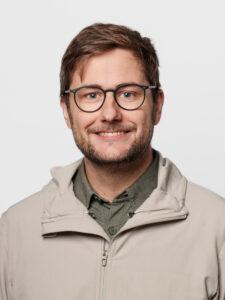
Conservation technology describes utilizing technology for wildlife conservation and is a field that has found rapid growth in the twenty-first century. A challenge in conservation technology is as the field itself is a collaboration between biologists, engineers, and computer scientists it has a high barrier-to-entry and often students do not get introduced until graduate school or later. Over the last several years we have worked to change this through creation of a project-based course on zoo-academic collaborations. This course works to create interdisciplinary teams that can develop conservation technology with wildlife conservation partners including zoos, wildlife facilities, and more. This course’s projects are made successful through a longstanding collaborations both in the United States and Germany allowing students to create technology that can help provide enrichment to diverse species while giving undergraduate students exposure to conservation technology. In this talk I will give an overview of research projects that utilize bio-inspired robotics, conservation tools, and conservation technology to help wildlife conservation. I will show showcase some of the specific technology created by students including an open-source wildlife tracker for bald eagle monitoring, a machine-learning enabled rabies vaccine distributor, and an automated feeder for western lowland gorillas.
Andrew K. Schulz is an Alexander von Humboldt postdoctoral fellow and postdoctoral researcher in the Haptic Intelligence Department at the Max Planck Institute for Intelligent Systems in Stuttgart, Germany, and is an Associated Postdoc in the International Max Planck Research School for Intelligent Systems (IMPRS-IS). He earned his Ph.D. in Mechanical Engineering at Georgia Institute of Technology (Georgia Tech) in 2022. Schulz’s graduate thesis work in the Hu Laboratory for Biolocomotion focused on biomechanics across length scales in the elephant’s trunk with applications in robotics, health, and sustainability. As a postdoctoral researcher, Schulz leverages functionally intelligent biological composites for haptics, biomechanics, and robotics applications. His work takes inspiration from different animal systems and combines engineering and material science and interdisciplinary collaborations with biologists, local zoos, and natural history museums to investigate comparative haptics. Schulz’s engineering work is featured in the American Museum of Natural History and has been featured in the New York Times, The Atlantic, NPR, and Science Friday. As an autistic researcher, Schulz has worked to advocate for neurodivergent and autism accessibility in research and beyond.
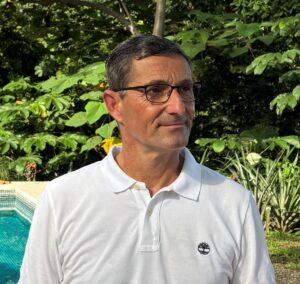
Currently, human consumption surpasses the planet’s capacity to sustainably support health and maintain biodiverse ecological systems. The two major challenges to be met for preserving a healthy human life on a healthy planet are sustainable generation und use of energy and food. My lecture will focus on the critical need for a sustainable food system, a cornerstone in building a viable and healthy future for both humanity and the planet.
As we navigate the Anthropocene, humanity faces enormous environmental challenges. Our increasing population, which stands at 8 billion today and is projected to reach 10 billion by the end of this century, places significant stress on land, water and biodiversity and contributes to the acceleration of climate change. These issues call for an overhaul and upgrade of our food and healthcare system, to render both more resilient. Fortunately, we are armed with an unprecedented array of knowledge, cutting-edge technologies, and innovative tools. The converging revolutions in biotechnology and information science present substantial opportunities.
Nutrition occupies a pivotal role at the intersection of human health, animal welfare, and environmental sustainability. It encompasses the management of global food supplies to meet population demands sustainably, the advancement of personalized and precision nutrition to optimize individual health outcomes, and the exploration of bioactive compounds in natural food sources. The objectives of modern nutritional science are to support human health and wellbeing, contribute to disease prevention, and extend the health span concomitant with increasing life expectancies. Concurrently, nutrition must be practiced with an acute awareness of sustainable resource utilization, aiming to mitigate lasting detrimental effects on the environment and climate.
To meet these seemingly overwhelming and partly competing challenges of our era, nutrition science is progressing toward a systems-based, translational approach. This (r)evolution requires the development of sustainable food systems, a healthcare system that balances efficiency with affordability, and the creation of nutritional and dietary plans customized for diverse consumer and patient needs and demographics. Achieving a sustainable food system necessitates a greater reliance on plant-based sources for essential macro- and micronutrients as well as phytochemicals. An efficient and cost-effective healthcare system should integrate comprehensive nutritional strategies – encompassing general, medical, and clinical nutrition – to augment and complement the traditional pharmaceutical interventions. Personalized nutrition, moreover, depends on translational research that incorporates detailed phenotyping of participants to ensure the representation of various population segments.
Under this scope and context, I will review a collection of (partly own) scientific work that addresses the interconnected streams of sustainable nutrition and healthcare, as well as the advancement of nutrition as a translational science. These contributions utilize systems biology and data science to elucidate intricate physiological processes, thereby reinforcing the conceptual framework of nutrition as a systems science. My talk will include studies that utilize omics technologies, artificial intelligence, and bioinformatics to identify and validate plant-based sources for high-quality proteins, micronutrients, and bioactive compounds. Additionally, this body of work highlights how integrating indigenous knowledge with contemporary scientific approaches can offer innovative solutions to current food system challenges.
Martin is Head of Science at the Competence Center for Nutrition (KErn). KErn is an institute within the Bavarian Research Organisation for Agriculture (LfL) and facilitates integrated solutions for a healthier and more sustainable food system in Bavaria, Germany, a federal state with 13 M inhabitants. Martin is also CEO and Founder of Kussmann Biotech GmbH, a biotechnology consulting firm in the fields of health, nutrition, and sustainability. Through this function, he is SAB Chair for NemaLife Inc. TX, USA; and GreenBioPeptides S.A. Barcelona, Spain, two tech-bio companies in the bioactive space for nutra-, pharma- and cosmeceuticals. Trained as a biochemist Martin has accomplished a 30-years dual corporate/academic career with experience in nutrition, pharma, and biotechnology. He held professorships at EPF Lausanne, Switzerland; Aarhus University, Denmark; and Auckland University, New Zealand. Martin has (co-)created four research units, scientifically led three institutions, and is credited with ~200 publications.

The Water-Energy-Food-Ecosystems (WEFE) Nexus approach is an innovative interdisciplinary area for research and teaching that is underleveraged in research, in practice, and in an academic setting, despite harbouring huge potentials to tackle key climate change issues. This talk explores potential opportunities for climate action and how these can be operationalised in research, practice and in teaching.
Dr. Daphne Gondhalekar is a research scientist at the Chair of Urban Water Systems Engineering, School of Engineering and Design, Technical University of Munich, Germany, where she heads the TUM Nexus Lab Nexus@TUM. Her research focus is integrated urban and regional planning using a Water-Energy-Food-Ecosystems (WEFE) Nexus approach and multi-stakeholder participatory co-creation processes in Africa and Asia. She holds a Ph.D. in Ecosystem Studies from The University of Tokyo, and a Masters and Bachelor in Architecture and Urban Planning, from the Swiss Federal Institute of Technology Zurich (ETH) and University of Glasgow respectively. Prior to joining TUM, she worked as a Postdoctoral Associate at the Department of Urban Studies and Planning at Massachusetts Institute of Technology (MIT), USA, and Center for Development Research (ZEF), University of Bonn, Germany.
Shared Session with TUM Center for Culture and Arts
We are excited to invite you to the lecture Nature 2.0: Art, Algorithms, and the Mutations of the Living, followed by a Q&A session with the artist.
For over four decades, Miguel Chevalier has been exploring both the visible and invisible dimensions of life through the lens of digital technology. In this lecture, the artist reflects on his career and presents the main themes of his ongoing research into a reprogrammed nature — one reinvented through algorithms, data flows, and generative aesthetics. Through emblematic series such as Fractal Flowers, Digital Abysses, and Meta-Nature AI, Chevalier questions our relationship with living systems in the age of artificial intelligence, simulation, and co-creation with machines. Algorithms become poetic tools capable of generating new forms, imaginary ecosystems, and hybrid species — at the crossroads of the real and the virtual. Yet Chevalier’s work does not remain confined to the immaterial realm of the digital. He embraces a post-virtual approach, in which algorithmically generated worlds of code and light take on tangible form as sculptures, engravings, 3D prints, holograms, or site-specific installations. Beginning in the virtual, he returns to the real — not to reproduce it, but to reveal its complexity, beauty, and fragility through new lenses. His work is in constant metamorphosis, at the intersection of science, art, and contemplation.
Important Details:
- Start: 11:00 AM
- Duration: about 1.5h
- Location: Audimax der HFF München, Bernd-Eichinger-Platz 1
The TUM Center for Culture and Arts offers a diverse cultural programme for the university community, spanning music, literature, fine arts, performing arts, and digital arts. Open to all members of the TUM community and friends of TUM, its wide-ranging activities encourage the discovery of hidden talents, broaden horizons, and foster exchange across disciplines.

Climate change poses an escalating global challenge, as recent floods in Libya, Brazil, and Spain have tragically demonstrated the dangerous situation we live in, especially with the increasing frequency of such incidents. The transport sector, responsible for nearly a quarter of global Greenhouse gas emissions, remains a major contributor to urban air pollution and climate impacts. Technological and shared mobility solutions such as ride-hailing and carpooling are frequently promoted as sustainable alternatives and endorsed by the EU’s Urban Mobility Framework. Yet, many of these claims lack empirical validation or transparent evaluation,raising concerns of Greenwashing—the dissemination of misleading or exaggerated environmental claims.
Investigating greenwashing in the transport sector, aiming to identify its dimensions, behavioral implications, and potential mitigation strategies, is becoming a must. In this lecture, we will discuss the different dimensions of Greenwashing, and we will try to understand how we could stop it together.
Dr. Abouelela is a civil and transportation engineer with over 19 years of experience in the transportation industry. He is a lecturer and head of the Transportation Data Analytics research group, in the chair of Transportation Systems Engineering, specializing in Transportation Systems Engineering and technology-based mobility. He holds a bachelor’s degree in Civil Engineering from Ain Shams University, Egypt, and both a Master of Science and a PhD in Transportation Systems from the Technical University of Munich, Germany.
His research focuses on applying advanced data analytics to understand, model, and improve transportation systems. Combining a strong foundation in transportation planning and infrastructure design with expertise in data-driven modeling.
This semester, we have collaborated with BenE München to organize city walk tours that can help you better understand yourself and the city of Munich.
The first city walk tour will take place on 01.12 between 2-4 PM and starts in Neuperlach.
To register for the walk, please send an email to info@bene-muenchen.de and indicate that you are from the Environmental Lecture Series.
All the additional info and exact meeting points can be found by scanning the QR code on the poster attached below.
We hope to see you there!

Room 2750 (Karl Max von Bauernfeind Hörsaal)

How can we make our city more sustainable – and what role do we ourselves play in the process? In our Urban Walking workshop, we explore this question – quite literally.
Using the method of mindful walking, we explore the urban space in Maxvorstadt, observe city structures, and gather impressions that open up new perspectives on sustainability topics. Every street, square, and encounter becomes a learning space: we see how resources are used, where potential for change lies, and which social, ecological, and economic dynamics shape the city.
Here’s how it works:
- You move consciously through Maxvorstadt.
- Playful tasks and small “assignments” direct your attention to the environment, infrastructure, and social interactions.
- Through observation, reflection, and discussion, you develop new insights and ideas for sustainable urban design.
Whether you are a student, urban planner, artist, or simply curious, this workshop offers the opportunity to explore urban sustainability in a practical, creative, and experiential way.
The game can be downloaded anytime [link to be provided] until November 30, 2025, or picked up from the RiVo team after the lecture on Wednesday, November 19 and 26. Please complete the game before December 3, 2025, so we can discuss it in the lecture.
Come by, head out into the city, and discover how every step can lead to a more conscious way of interacting with our city and environment!
Karl Michael Lange is a Dipl.-Ing. in Urban and Regional Planning and IHK-certified Transformation Manager for Sustainable Culture. Lange leads a studio for creative strategies in sustainable thinking and action and is chair of the associations Produktionskollektiv Wien and Region Stuttgart.
He has worked as a project manager for creative sustainability and the energy transition at Theater RAMPE in Stuttgart and is active across Europe as an expert in artistically motivated sustainability projects.
Currently, Lange teaches at the Freie Kunstakademie Nürtingen (FKN_Lab for Art and Sustainability), Hochschule für Technik Stuttgart (ZNS – Sensory Lab), and New Design University St. Pölten (Food Design, Food System Design, Food Activism). He is also an adjunct lecturer in Human Intelligence at Green University Pécs and in Art, Sustainability, and Entrepreneurship at UnaVersity Ecovillage Herzersberg/Küstrin. He supports Chinese youth in developing sustainable products and business models in collaboration with the Goethe-Institut Beijing and the Mercator Foundation’s China Education Network.
In 2024, he co-founded the Vienna School of Art and Sustainability in cooperation with SOHO Ottakring and, together with Laura Cadio, the platform communi:greens for educational projects on sustainable thinking and action. He also collaborates with Anna Szilágyi-Nagy and Lisa Sperrling-Dossa under the label circular.community in Stuttgart, offering strategies for creative sustainability and consulting for collectives, companies, institutions, and municipalities.
Upcoming projects include artistic sustainability installations at Klima Biennale Vienna and Alte Feuerwache Mannheim in 2026, and at the International Garden Exhibition (IGA Ruhr) in 2027.

The acceleration of AI development, as well as the deepening of its centrality in geopolitics, have led to an international rush to achieve what many have called “sovereignty” in the digital realm. Policies aiming to promote digital sovereignty, nevertheless, do not treat the interests of all communities equally, and the way in which some groups are impacted by digital technologies varies according to criteria such as race, class and origin, revealing updated dynamics of coloniality. This presentation thus discusses how the digital ecosystem impacts Indigenous Peoples in Brazil from three distinguished angles: data extractivism, occupation of territory and exploitation of resources. The goal is to identify how existing digital policy frameworks reproduce or challenge colonial power relations.
José Renato Laranjeira de Pereira is a PhD Researcher at the University of Bonn’s Sustainable AI Lab investigating the digital industry’s impacts on Indigenous territories in Brazil. He is also a co-founder of the Brazilian NGO Laboratory of Public Policy and Internet – LAPIN, and a Full Member of the Brazilian Federal Administration’s Central Committee on Data Governance. Previously, José Renato was a UNESCO consultant for the 2024 Brazilian Presidency of the G20 within the Digital Economy Working Group. In 2021, he was awarded the Alexander von Humboldt Stiftung’s German Chancellor Fellowship to conduct research on the AI Act as a Visiting Researcher at the European Parliament. He was also a member of the multistakeholder groups that reviewed the Brazilian AI Strategy.

As public awareness for the environmental and social impact of AI technologies grows, questions about the appropriate measurement and assessment of these impacts abound. Conceived as a contribution to this discussion, this talk presents insights into the current landscape of the AI ethics field, with special consideration for discussions about “sustainable AI”. It asks what kind of approach, perspective and concepts are necessary to properly assess the sustainability impact of AI technologies. In answering this question, it maps a shift which can currently be perceived in AI ethics literature: From impact analyses of concrete AI technologies (algorithms, hardware, etc.) to a structural approach which uncovers ethical issues on a broader scale. Crucially, this shift of perspective also brings in, or rather uncovers, a political dimension to these discussions.
Larissa Bolte is a research associate and PhD candidate within the Bonn Sustainable AI Lab of the Institute for Science and Ethics at the University of Bonn, Germany. She holds an MA degree in philosophy and has published in a variety of peer-reviewed venues on AI and sustainability, AI and critical theory as well as philosophy of technology and extractivism. Larissa’s PhD project links these research interests by investigating the notion of “sustainable technology” through the lens of Frankfurt School critical theory, specifically Adorno’s notion of “natural history”.

City governments worldwide use digital systems to fulfill their daily tasks: traffic flow management, internal workflow organization and public facing digitized web forms are amongst the most common systems implemented. These systems are often implemented to bring about greater governmental efficiency and transparency, as cities tackle fiscal austerity and perceive declining public trust. Yet, many scholars question whether these ambitions can truly be realized through the technologies deployed, as well as pointing towards these goals being political in nature, while the technologies are often sold as apolitical tools facilitating common sense politics, masking political decisions as mere resource allocation problems.
Despite scholarly contestations, these logics are more recently extended to policy fields that are less commonly regarded in terms of engineering problems, such as care. Yet from feminist scholarship we know that care, while immensely shaped by resource access, needs more than efficient resource allocation to flourish.
So, accounting for the scholarly engagements with smart cities and care, could we imagine digital infrastructures for care that are guided by different values? What would it mean to design technologies that truly support caring urban relations rather than merely making them more efficient?
Together with the audience, Julia invites reflection on how digital systems might become part of genuine urban caring networks. Drawing on her empirical research on smart cities, she shares insights into how people understand the notions of “smartness” and “care,” and explores how these concepts and technologies might be reimagined.
Throughout studying geography in Heidelberg and at the University of Denver, Colorado, Julia Schinnenburg has looked at power differences between different actors in cities and how these differencescould be renegotiated, both through participation methods as well as infrastructural changes. After finishing her master’s in the US, she worked as an IT consultant, which has inspired her interest in digital systems which she pursues in her current doctoral research at the Heidelberg Center for American Studies (Universität Heidelberg). In her research projects, she leverages mixed-methods to understand how wider trends manifest and are negotiated locally.
This semester, we have collaborated with BenE München to organize city walk tours that can help you better understand yourself and the city of Munich.
The second city walk tour will take place on 13.01 between 2-4 PM and starts in Mangfallplatz.
To register for the walk, please send an email to info@bene-muenchen.de and indicate that you are from the Environmental Lecture Series.
All the additional info and exact meeting points can be found by scanning the QR code on the poster attached below.
We hope to see you there!

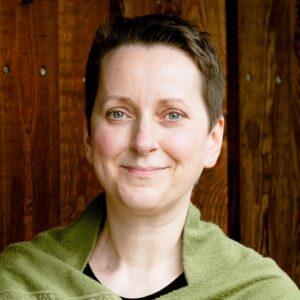
AI is the technology promised to solve humanity’s biggest problems, most prominently climate change. However, AI itself comes with huge environmental (and social) collateral damage, mostly hidden from public sight and out of reach. This lecture will shed some light on the price that nature and humans pay for the AI gold rush, sketch out better ways to use and manage the here-to-stay technology, and critically assess the existing ideas and plans for that. Eventually, the audience is invited to discuss the means each of us has to contribute to a more responsible future use of AI.
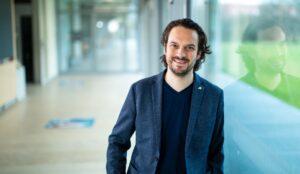
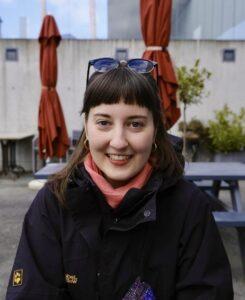
Finance shapes the world more than most of us realise. In many ways, it is a mirror into the future, revealing which industries will thrive, which energy sources will dominate, and how the climate catastrophe has unfolded — and will continue to unfold. In this talk, I will explore the systemic connections between the financial sector and the fossil fuel industry, asking the fundamental question: who funds the climate crisis, and how do their choices change the climate and destroy ecosystems?
Drawing on Urgewald’s 30-year history of data-driven finance campaigns, we will examine how investment flows, often hidden behind complex ownership structures and greenwashed products, continue to prop up polluting industries, and how civil society and research can shed a light on these networks. The lecture will also consider the broader role of banks, investors, and regulators in either enabling business-as-usual or steering finance toward a more sustainable future.
Attendees will be invited to think critically about the power of financial decisions, learn how to cut through the noise of industry narratives, and see how campaigns challenge the financial flows driving the climate crisis.
Hannah O’Neill is a Finance Researcher and Campaigner who joined Urgewald in early 2025. She holds a B.A. in Political Science from Bamberg University and an M.Sc. in Social-Ecological Economics and Policy from the Vienna University of Economics and Business.Before joining Urgewald, she began a PhD with the Environmental Protection Agency at University College Cork. Motivated by the urgency of the climate crisis, she shifted to a more hands-on career path and now focuses on translating research into climate action.
 “Rising sea levels are an existential problem – especially when the place you call home is an island in the South Pacific. Students Solomon, Vishal and Romabeth have a plan: to use a legal loophole to get their case heard at the International Court of Justice in The Hague. There is just one tiny little hitch…” – Jan Sebening
“Rising sea levels are an existential problem – especially when the place you call home is an island in the South Pacific. Students Solomon, Vishal and Romabeth have a plan: to use a legal loophole to get their case heard at the International Court of Justice in The Hague. There is just one tiny little hitch…” – Jan Sebening
The remarkable story of law students from the South Pacific who are taking their fight against climate change to the world’s highest court via a historic UN resolution.
Directed by Felix Golenko, who has been shooting documentary projects since 2013. Initially as an autodidact, later as a student at the Film Academy in Ludwigsburg. In addition to his expertise in film sound, he is interested in the philosophical aspects of anthropology, among other things.

DOK.fest is the largest film festival in Germany dedicated solely to documentaries. Every year in May, the DOK.fest welcomes well over 100 films, their makers, and, if possible, some protagonists in Munich. They screen at over 20 locations throughout the city and beyond. Since 2020, there has been a digital platform too, that offers these films to be enjoyed, discussed, or binged at homes throughout Germany. Celebrating excellence in the documentary cinematic art is as important to the Dok.fest as are the discoveries, discussions, and encounters for the guests and the audiences. The Student Award of DOK.fest München presents outstanding documentary films by students of German-speaking film schools.
Regular classroom and lecture time. Participating in this activity grants attendance points as in the usual lectures.
Location
 On-site: TUM Main Campus
On-site: TUM Main Campus
Room: N1190 (Hans-Heinrich-Meinke-Hörsaal)
Floor: 2
Building: U-Trakt (N1) (Nordgelände)
Location: Theresienstr. 90, 80333 München
Zoom Webinar
Webinar ID: 697 3247 4928
Password: 4Future
Contact us!
rivo@fs.tum.de
getting to the lecture hall
History of the Environmental Lecture Series
The lecture series on the environment is an interdisciplinary, public lecture series organised by the Environmental Department of the Student Union of the TU Munich. It is organised by TU Munich students on a voluntary basis.
Speakers have been giving lectures on the topic of sustainability since 1985. This includes, for example, technical environmental protection, health, consumer and climate protection. In this way, it offers both students and teachers at the TU Munich, as well as the non-university public, the opportunity to learn about and discuss these topics and research results at a scientific level.
The speakers from research, associations, authorities and companies will be happy to answer questions from the audience after the lecture; the slides of the lectures, and in some cases the video recordings themselves, will be made available – if available – on our website. In the 40 years of its existence, more than 480 lectures have been organised so far.
In the meantime, the lecture series on the environment has become a regular part of the TU’s lecture programme and is supported, among others, by the management of the TU Munich, the Munich Center for Technology in Society and the KHG of the TU Munich. The lecture series on the environment is a partner of the BNB, the “Alliance for Sustainability in Bavaria”. In addition, some lectures are held in cooperation with the Environmental Academy and the Munich Forum for Sustainability.
Check out our trailer! 😉
“As Vice President of TUM, I am proud to endorse the Environmental Lecture Series, RiVo. For nearly 40 years, TUM students have been at the forefront of this interdisciplinary initiative, providing a platform for knowledge exchange and facilitating critical discussions on the challenges and solutions surrounding sustainability. It is heartening to see speakers from diverse backgrounds sharing their expertise and enriching our understanding. RiVo educates, raises awareness and inspires action for a greener future. My heartfelt appreciation goes to the Student Council’s Environmental Department for their tireless dedication in organizing this invaluable series.“
Prof. Dr. Werner Lang
TUM Vice President for Sustainable Transformation
